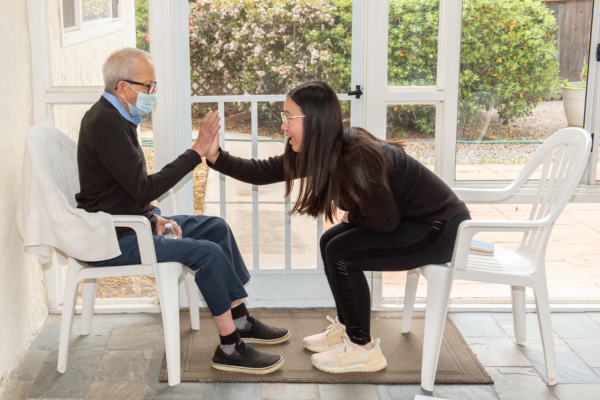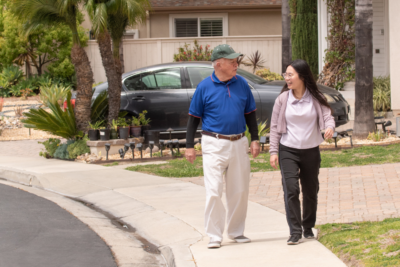
Our ALZ Companions Respite program is one that genuinely affects people living with dementia, care partners, and volunteers. Spending quality time with people is a special way of showing appreciation and support, especially for people affected by this disease. We’re happy to be able to provide this free service to people in San Diego County and we can only do it with incredible volunteers like the ones we’re spotlighting today.
Amy Kung became an ALZ Companion in 2020 because she wanted to gain healthcare-related experience, as well as support local organizations and “have a tangible impact” on her community. Nhi Nguyen began volunteering in 2018 when she was connected with us through her university and wanted to spend time helping families. We asked Amy and Nhi to reflect on their experience and how it has affected their lives, the families they’re partnered with, and what lessons they’ve learned. Here are the perspectives they shared:
What dementia misconceptions did you have before joining the ALZ Companions program?
Amy: I used to believe that there is somewhat of a linear process to the progression of dementia. But I have come to find that my companion, Firoz, will sometimes recall things from the past that I thought he forgot, or he might surprisingly display expertise in one skill but not another. For example, we used to do a lot of word search puzzles together, and unfortunately his ability to complete these puzzles has now declined, but he is still great at reading. It feels like what he can and can’t do can be sometimes unpredictable.
Nhi: Interacting with persons with dementia and their families has debunked many stereotypes of dementia I had previously internalized. Dementia manifestation is highly variable across individuals and different from the stereotypes portrayed in mainstream media.
What did you learn after your initial ALZ Companion visits and did you have to adjust your approach?
Amy: I definitely remember feeling very awkward during my very first Companion visit! I think I was so used to respecting my elders and deferring to them, and it felt almost ‘wrong’ to tell my companion what he could or couldn’t do. For example, I recall he wanted to open the door and walk but I struggled with telling him ‘no’ and it took some time to convince him not to. Over time, I told myself that being firm and confident is for his safety, and it became easier.
Nhi: I learned that nonverbal communication is essential to people living with dementia and adjusted my communication approach accordingly. I tried to be mindful of the surrounding environment (e.g. light, sound, distractions, etc.) as well as nonverbal signs or gestures to clients. I also tried to reflect on how a person with dementia may perceive things differently than I do.
What have care partners told you about how they benefit from visits?
Amy: I have been told by Firoz’ wife Farida that my visits allow her some time to herself. Usually she completes errands or just browses her computer, either way I am glad she can enjoy herself. She has also told me that it is very difficult for Firoz to listen to her when it comes to doing exercise. This is something we always try to do during my visits because being active has helped him a lot. So she is always happy to see that Firoz listens to me and does his exercises. (Though after more than three years together he has gotten comfortable with me and sometimes doesn’t want to do exercises with me either haha!)
Nhi: Care partners are appreciative of these visits as they have some time to themselves to exercise or run errands.
What’s a memorable experience you’ve had during a visit?
Amy: I think one of my most memorable experiences was when I asked Firoz how he met Farida. I learned that he has so much love for his wife and family, and that love is also returned to him. I just felt very grateful to be a part of their lives and the effort to support him.
Nhi: Lots of memorable experiences – listening to music, sharing pictures, taking walks with clients and care partners have been wonderful. Resuming visits after a long COVID hiatus.

What knowledge/skills have you gained throughout your experiences that help you connect better with clients now?
Amy: I think a few important skills I’ve taken from this experience include being patient and adaptable. It’s important to not rush companions or expect them to understand what you are saying immediately. For example, when doing exercises with Firoz I try to go at his pace instead of mine. I’ve also learned to change how I ask Firoz questions as his dementia has progressed. In the past I may have been able to ask him open-ended questions, but now I try to keep it simple like asking yes or no questions.
Nhi: One thing I have learned is that things can be unpredictable, some days will be quieter than others. Over time I have become more flexible with visit agendas and also more comfortable with periods of silence.
What life lessons have you taken away from this experience?
Amy: I’ve learned that my companion’s wife is so strong, beautiful, and wise. She, along with her family and community of friends, have all contributed in supporting Firoz, and I think it’s this immense amount of love that has mitigated his progression and kept him as healthy as possible. I find Farida so inspiring and I have a new appreciation for care partners like her.
Nhi: My clients with dementia and care partners have taught me so many valuable life lessons. I have listed some of them, they may sound cliché but seeing how they are practiced in daily lives is empowering.
- Let your loved ones know you love them.
- Live in the present.
- Mistakes happen. Learn, forgive yourself, and move on.
What would you say to someone who wants to volunteer to be an ALZ Companion but is hesitant or nervous to take on the responsibilities?
Amy: Go for it! And if you are nervous there is a great support system in both the volunteer coordinator/director and fellow volunteers. There is a space for us to share our experiences and how to improve upon them.
Nhi: I am glad you are considering ALZ Companion volunteering. The ALZ Companion experience has been very meaningful to me. It can feel daunting and nerve-wracking at first, but the families and the Alzheimer’s San Diego staff provide wonderful support and truly appreciate you! I am happy to answer any questions you have about the volunteer program.
If you are interested in volunteering for the ALZ Companions Respite program, you can visit our volunteer page. For more general information on the program, click here or call our office at 858.492.4400.
By Braulio Ambriz




